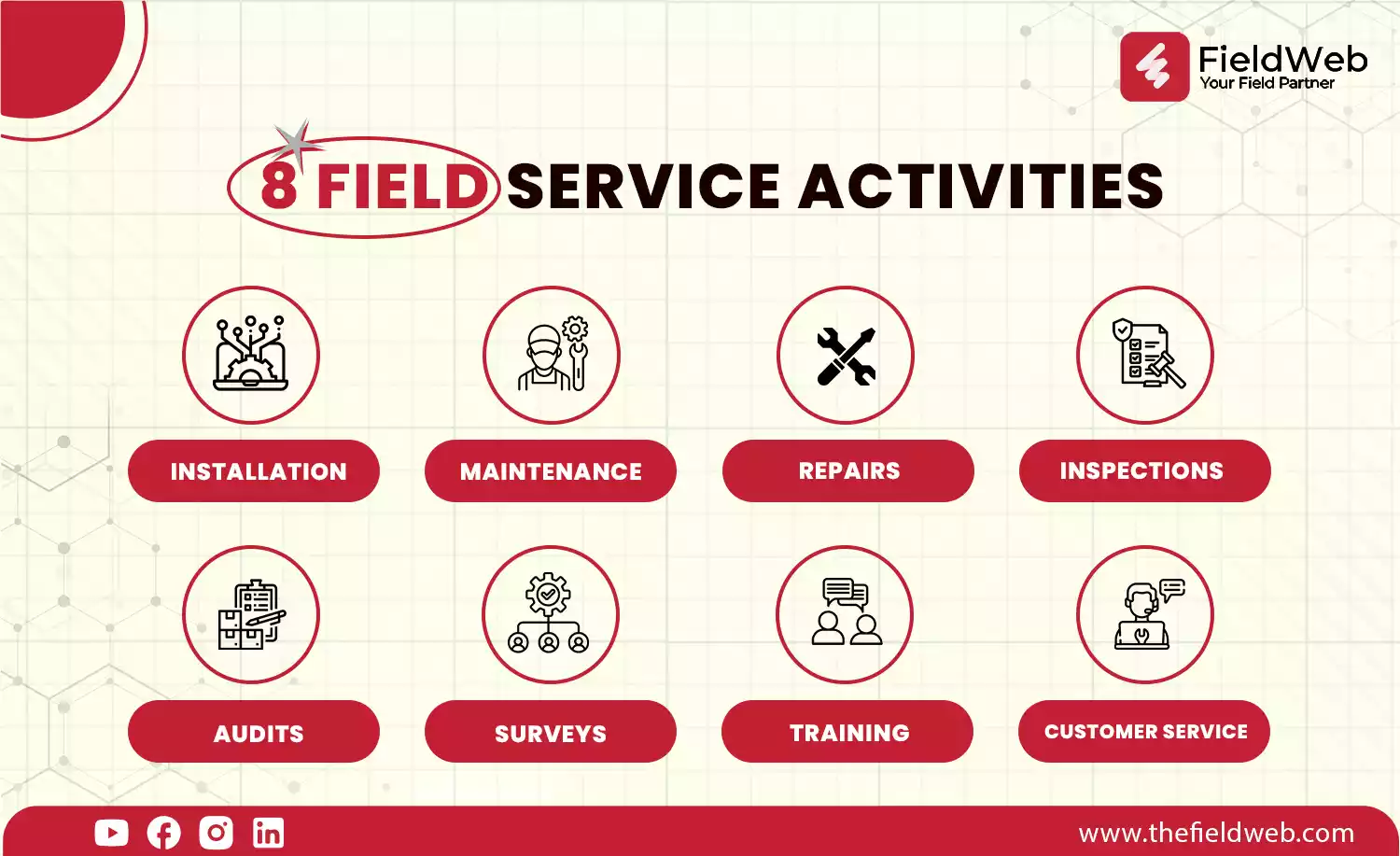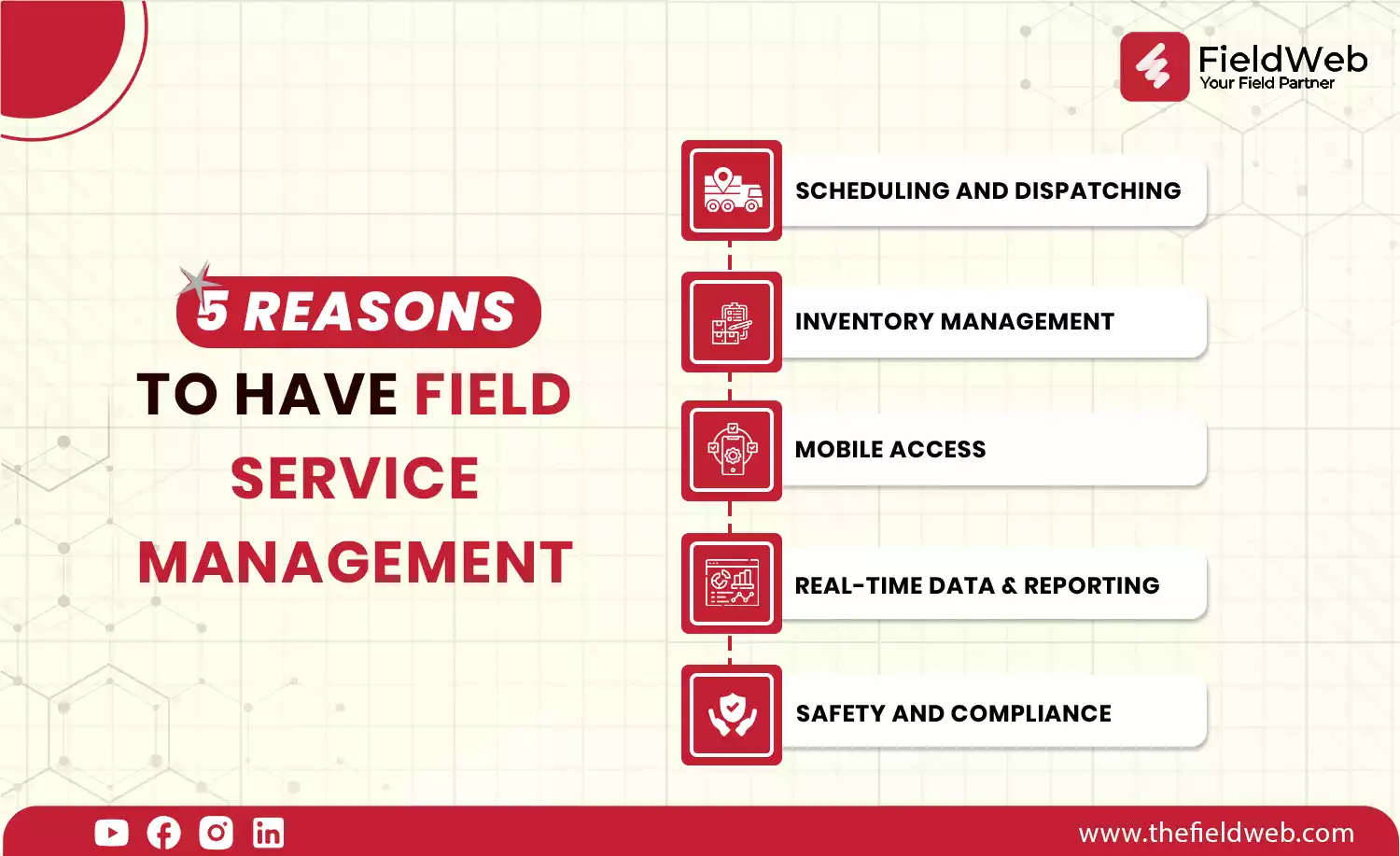FieldWeb Blog.
Get the knowledge and inspiration you need to run your home and commercial service business better.

In today's fast-paced and ever-evolving world of business, it is important to stay on top of your game, and Field Service Management (FSM) is an essential component to do just that. FSM refers to the management of resources that are deployed to provide on-site services to customers. These resources include technicians, equipment, and vehicles.
The goal of FSM is to optimize the scheduling and dispatch of technicians to meet customer demand while minimizing costs and maximizing efficiency. In this blog post, we will explore what field services are, why field service management is important, and how FieldWeb can provide a solution to streamline your business operations.
Field service activities can encompass a wide variety of tasks, and the specific activities that are included will depend on the industry and type of service being provided. Here are some of the most common types of activities that are included in field service:

1. Installation: Field service technicians may be responsible for installing equipment or systems at a customer's site. This could involve anything from setting up a new computer network to installing a large-scale manufacturing system.
2. Maintenance: Regular maintenance is a crucial part of many field service operations. Technicians may be responsible for performing preventative maintenance, troubleshooting and repairing issues, and conducting regular inspections of equipment.
3. Repairs: When equipment breaks down or malfunctions, field service technicians may be dispatched to fix the issue on-site. This could involve replacing parts, performing repairs, or providing temporary workarounds until a more permanent solution can be implemented.
4. Inspections: Inspections are an important part of many field service operations, especially in industries like construction and manufacturing. Technicians may be responsible for inspecting equipment or systems for safety, compliance, and quality control.
5. Audits: Audits are similar to inspections, but are focused on assessing the efficiency and effectiveness of a system or process. Field service technicians may conduct audits to identify areas for improvement and suggest changes to optimize performance.
6. Surveys: In some industries, field service technicians may be responsible for conducting surveys to gather information about a particular site or system. This could include gathering data about environmental conditions, conducting site assessments, or collecting customer feedback.
7. Training: In some cases, field service technicians may be responsible for training customers or employees on how to use new equipment or systems. This could involve providing on-site training sessions or developing training materials.
8. Customer Service: Field service technicians often interact directly with customers, and providing excellent customer service is a key part of many field service operations. Technicians may be responsible for addressing customer concerns, answering questions, and providing support.
These are just a few of the many different types of activities that may be included in field service operations. The specific activities that are included will depend on the industry and type of service being provided. Effective field service management is crucial to ensuring that these activities are performed efficiently and effectively, and that customers receive the highest quality of service possible.

The field service industry faces several unique challenges that can impact the efficiency, effectiveness, and profitability of the business. Here are some of the most common challenges that field service businesses face:
1. Managing a mobile workforce: Field service technicians typically work in the field, which can make it difficult to manage their schedules, track their progress, and ensure that they are working efficiently. This can be especially challenging for businesses that operate in large geographic areas or have a high volume of service requests.
2. Meeting customer expectations: Field service businesses are often the face of the company for customers, and providing high-quality service is crucial to maintaining a positive reputation. However, meeting customer expectations can be difficult, especially when customers have different needs and preferences.
3. Balancing costs and profits: Field service businesses often operate on tight profit margins, and it can be a challenge to balance the costs of providing service with the need to generate profits. This can be especially difficult in industries with high competition and low prices.
4. Managing inventory and logistics: Field service businesses often need to carry a significant amount of inventory, tools, and equipment to provide service. Managing inventory and logistics can be a challenge, especially in industries with high demand or fluctuating service requests.
5. Recruiting and retaining skilled technicians: The field service industry relies on skilled technicians to provide service, and recruiting and retaining these technicians can be a challenge. This is especially true in industries with high turnover rates or a shortage of skilled workers.
Effective field service management is crucial to overcoming these challenges and ensuring that field service businesses operate efficiently and profitably. The right tools, software, and strategies can help businesses streamline their operations, improve customer satisfaction, and stay competitive in the market.
Field service management (FSM) is an essential aspect of any field service business, and it plays a vital role in addressing the many challenges that come with managing field service operations. Here are a few ways in which FSM can help tackle some of the most common challenges:

1. Scheduling and Dispatching: One of the most significant challenges in field service is scheduling and dispatching technicians to job sites efficiently. FSM software can help optimize schedules and dispatch the right technician to each job based on factors such as location, skills, and equipment. This can reduce travel time and improve first-time fix rates, leading to cost savings and increased customer satisfaction.
2. Inventory Management: Another significant challenge in field service is managing inventory and equipment. FSM software can help businesses keep track of inventory levels and ensure that technicians have the right tools and parts for each job. This can reduce downtime and increase efficiency, leading to cost savings and improved service quality.
3. Mobile Access: With the rise of mobile devices, FSM software that can be accessed from smartphones and tablets has become increasingly important. This can help technicians access work orders, customer information, and inventory data from the field, improving communication and collaboration between technicians and office staff and leading to faster problem resolution and improved customer satisfaction.
4. Real-Time Data and Reporting: FSM software can provide real-time data and reporting on key performance metrics, such as technician utilization rates, first-time fix rates, and customer satisfaction. This data can be used to identify areas for improvement and optimize business processes.
5. Safety and Compliance: Finally, FSM software can help businesses manage safety and compliance by tracking technician training and certifications and ensuring that the right safety protocols are in place. This can reduce the risk of accidents and violations and help businesses maintain compliance with industry regulations.
In summary, FSM software can help field service businesses address many of the challenges they face by optimizing schedules, improving inventory management, providing mobile access, offering real-time data and reporting, and managing safety and compliance. By using FSM software to improve their operations, businesses can increase their efficiency, reduce costs, and enhance their customer service.
Field service management can be a complex and challenging business, with many unique considerations that businesses need to keep in mind. However, with the right tools and strategies in place, businesses can overcome these challenges and provide high-quality, efficient service to their customers.
One such tool is FieldWeb, a comprehensive field service management platform designed to help businesses optimize their workflows and improve their customer service. With features such as scheduling and dispatching, inventory management, mobile access, real-time data and reporting, and safety and compliance management, FieldWeb can help businesses overcome many of the challenges facing their field service operations.
By using FieldWeb, businesses can improve their efficiency, reduce costs, and enhance their customer service, which can lead to increased profitability and a competitive edge in the market.In conclusion, field service management is a vital aspect of many businesses, and it is important to address the challenges that come with it. With the help of tools like FieldWeb, businesses can effectively manage their field service operations and provide high-quality, efficient service to their customers.